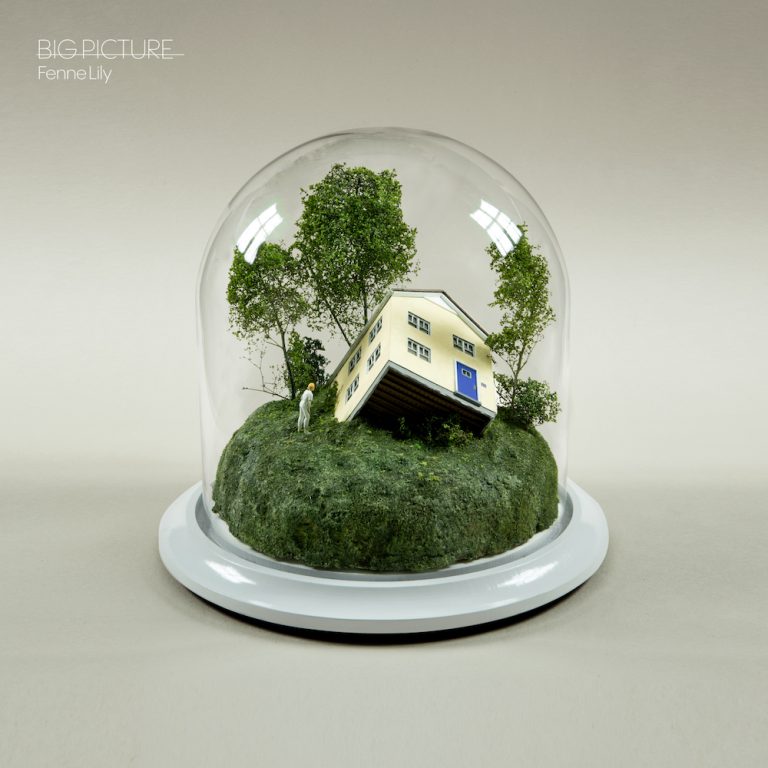With her second album, 2020’s Breach, Dorset-born, Bristol-based Fenne Lily reveled in thorny anecdotes while venting disappointment and pushing against sociopolitical norms. All the while, she honed her gift for melody, introduced via her debut, 2018’s On Hold. With her latest album, Big Picture, she continues to tweak her craft, navigating a slew of seductive hooks, beats, and atmospheres. Lyrically, her latest sequence is decidedly reflective, occurring as the inevitable assessment that follows an initiation or a blow to one’s innocence.
“You’re getting tired of looking at the same old sky / and I’m getting tired of feeling like the same old guy”, she declares on opener “Map of Japan”, addressing how difficult it is to transcend one’s own psychological defaults and break out of relational patterns. Sonics are muggy yet crystalline, turbid yet buoyant, due in large part to Lily’s elastic melody, Kane Eagle’s nomadic bass, and Joe Sherrin’s electric-guitar accents. While Lily has clearly absorbed “dream” and slowcore templates, including work by Cat Power and Grouper, she successfully reconfigures them to bolster her own iteration of pop-informed folk.
On the irresistible “Dawncolored Horse”, Lily’s timbre is well-modulated, conveying subtle movements between assurance and doubt, muted confidence and cautious vulnerability. Sherrin’s guitar runs are bright and sinewy, pulling against James Luxton’s drum part, which in turn heightens the song’s inherent tensions. On “Lights Light Up”, meanwhile, brushy drums and a busy guitar part contrast with Lily’s languid melody. Her viewpoint moves between a first- and third-person perspective, alternately diaristic and analytical, immersive and detached.
With “2 + 2”, Lily dives into a distinctly funereal tone; “… guess I don’t really know what I’m looking for / you shut your eyes and I shut my door”, she moans, presenting a telling snapshot. Facing conflict, one person collapses into denial, while the other seemingly loses her temper and issues a premature rejection. The song ends with Lily repeating “Hear me out”, which lands as an indirect apology and an invitation to reengage in meaningful dialogue.
With “Superglued”, she continues to explore a downcast tone, reflecting on a relationship that wasn’t sustainable while also recognizing that the break-up led to clarity, albeit clarity mixed with a lingering sense of loss. Lily’s textured vocals and Sherrin’s fiery guitar part recall a rich legacy, including Ani DiFranco’s early and volatile work, Laura Marling’s experimental side, and the rootsy essentials of Sharon Van Etten. Lily, however, finds her own balance between melancholy and resilience, again distinguishing herself from her possible forebears.
“Henry” features some of Lily’s most vivid lines and phrases (“bleeding in the restaurant sink”, “the wrong side of train tracks at speed”). A listener wonders if Henry and the singer are struggling lovers or simply friends who care deeply about one another. Traumatic events, possibly a suicide attempt, are at the center of the piece. Lily closes the song by annunciating, “I’m a bruise”, which one can’t help but consider alongside Kurt Cobain’s “I’m a stain”, the latter an expression of repressed rage and punk-inflected anhedonia, the former reflecting, instead, a leaning toward regret and psychogenic distress.
“Henry” is followed by the country-inflected “Pick”, which showcases Lily’s ability to construct and deliver an unadorned hook. One could hear Adrienne Lenker performing this piece, though she would probably drift in a surreally descriptive direction whereas Lily singularly mines the broad domain of pop confessionalism. Going with the Big Thief comparisons, Sherrin offers some of his most elegant melodic runs, reminiscent of Buck Meeks’ work, particularly on 2022’s Dragon New Warm Mountain I Believe in You. “Red Deer Day” similarly highlights Lily’s capacity to operate in a stripped-down context.
On closer “Half Finished”, the singer processes her personal struggles and relational ambivalence (“You ask me if I could change one thing about myself what would it be and why / I tell you I don’t know but sometimes I can’t help but picture a whole different life”). As with “Lights Light Up”, Lily moves between a first-person perspective, which facilitates a tone of immediacy, and a third-person take, which conjures distance and a position of pseudo-objectivity.
With Big Picture, Lily segues from the antagonistic postures of previous work, committing more pointedly to self-examination. In this way, the set unfurls as a self-revealing inventory that brings to mind AA’s fourth step adapted to music. What ultimately stand out, however, and what ultimately win over a listener, are Lily’s refined attunement to hook-filled melodic progressions and knack for channeling complex emotions through relatively conventional vocal performances. With Big Picture, her craft complements her talent, her talent infuses and elevates her craft.

